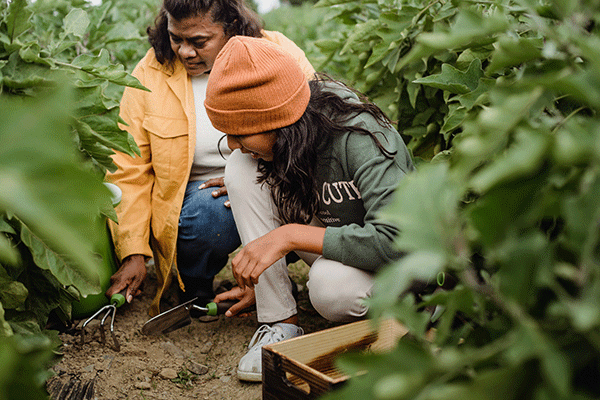Today marks International Women’s Day, where countries all over the world unite in the celebration of women’s achievements, raise awareness and rally for gender equality.
The theme this year is #BreakTheBias. And looking at bias in agriculture is of huge importance, as advancing gender equality in the time of the climate crisis is crucial for a more sustainable future.
The Regenerative Women on the Land group formed in 2021, following on from sessions at the Oxford Real Farming Conference, with the aim of creating a restorative place to connect and to inspire new entrants to farming.
At this year’s conference, discussions celebrated the growing number of female farmers and looked at how we can remove obstacles to welcome more in.
Globally, almost one third of employed women work in agriculture, including forestry and fishing. It is the most important employment sector for women in lower income countries, but less than 13 per cent of agricultural landholders are women. Women in the global south are also more vulnerable to the effects of climate change through greater dependence for both food and income on the land.

Group member and community horticulturalist Sandra Salazar pointed out the unacknowledged contribution women make to food production: “For the vast majority of indigenous women, mums and daughters that are growers, there is no paperwork, you are invisible – even though 70 to 80 per cent of worldwide produce is grown by women, they are still not given that acknowledgement.”
Within the UK, the number of women farmers is significantly lower. This is changing though – a rise from seven per cent in 2010 to 17 per cent in 2018 signals a significant shift. Ruth Hancock, who has farmed agroecologically in East Devon for over 20 years, entered farming college 40 years ago, when male lecturers questioned why there were two female students in a class of 32 farmers’ sons.
“Farming was seen as a dying industry in the 1980s,” she recalled, but said that women were early adaptors of organic. She’s seen the shift as awareness spread; her ex-classmates now compete by saying how many turtle doves they have on their land rather than barley yields. “I think they always cared about these things, but it wasn’t something they could be seen to care about.”

Clem Sandison of Alexandra Park Food Forest in Glasgow shared that: “Statistically maybe there is now more visibility of women working in the land, but ultimately women have been working the land for millennia.”
The statistics are useful to show that it is becoming less of a male-dominated industry, but women are often placed into the role of gardeners and caregivers, rather than decision makers. Sandison feels this is being challenged as “a whole generation of amazing young women” are bringing change, many of whom are adopting regenerative farming methods.
As the prevalent mechanistic, monocultural model of farming has increasingly separated us from nature, Sandison spoke of the importance of urban growing projects in sharing how to reconnect with food growing, bringing agroecological food production to the city.
The approach she takes integrates food into a wilder landscape in a manner that is sensitive to wild plants and animals, and as diverse as possible – including the diversity of those that work in it.
“How to enact honourable harvest and cooperate – all these are skills that in capitalism, white supremacy, and patriarchy, we don’t have that many opportunities to practise. We need to relearn them and work together on this,” she said.

Access to land is a massive barrier in the UK, as current structures are remnants of the tradition where oldest sons traditionally inherited farms. This attitude lingers on; practical skills training such as tractor driving and operating or fixing machines can be intimidating to learn, so there need to be more safe spaces for women to confidently learn skills and feel more empowered.
Lack of resources including adequate childcare, support networks and overwork can take their toll on women working on the land.
“I felt like I was representing the whole of womanhood. I didn’t feel like I could be average or just be alright,” said Hancock “Working to exhaustion is an issue in farming. It needs addressing” she said, making the connection between needing to rest areas of farmland, and let ourselves rest too, rather than striving for constant productivity that is out of sync with cycles in nature.
It is this connection between nurturing land and people that is helping to envisage a different way of interacting with the natural world, and an alternative to the dominant and currently male-orientated system, towards a way of growing food that is respectful, inclusive, and inspiring.
As Salazar put it: “It is about how that connection with the land empowers you, creating something that is regenerative and sustainable to inspire others and to bring that unity back.”












0 Comments